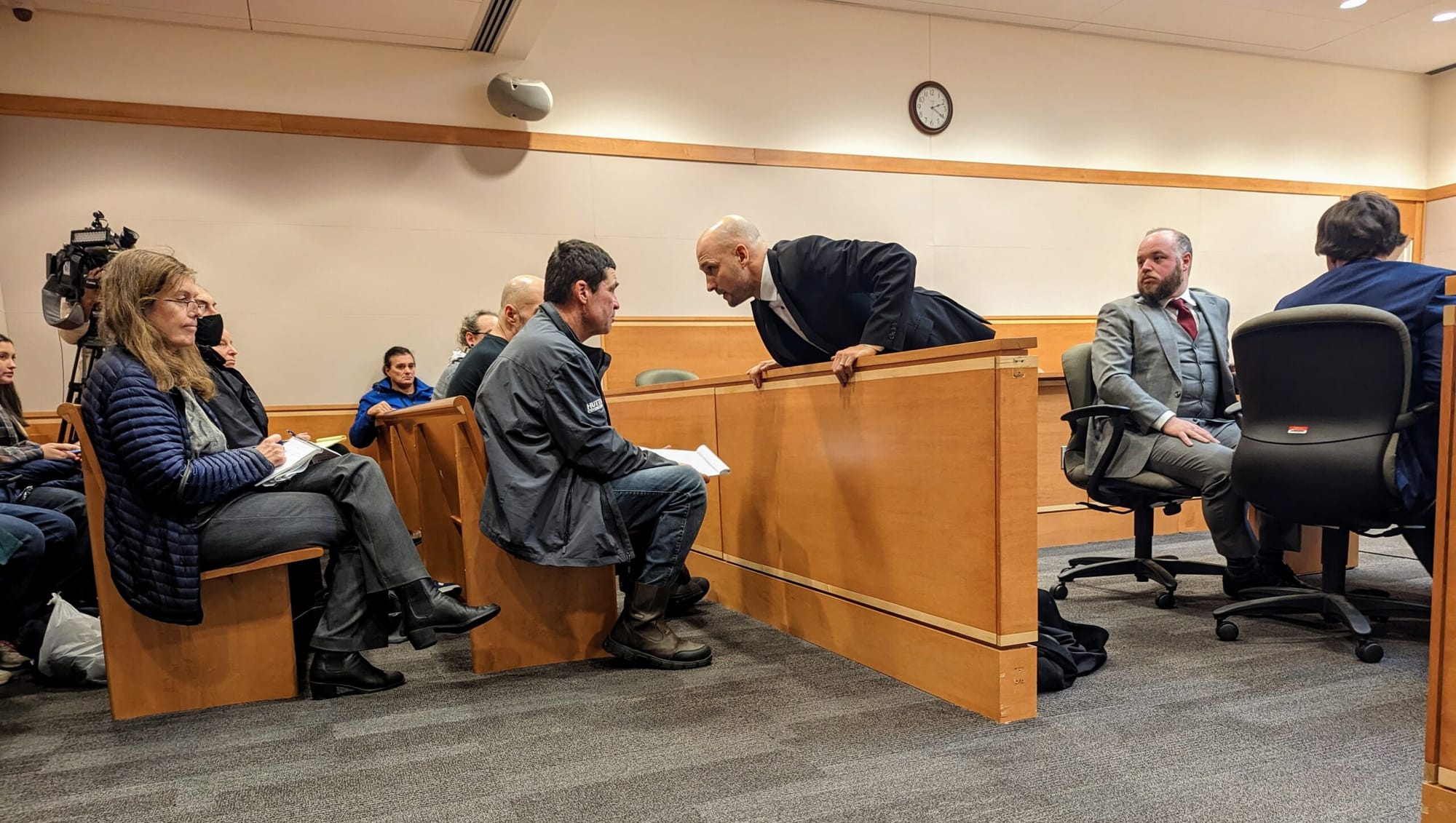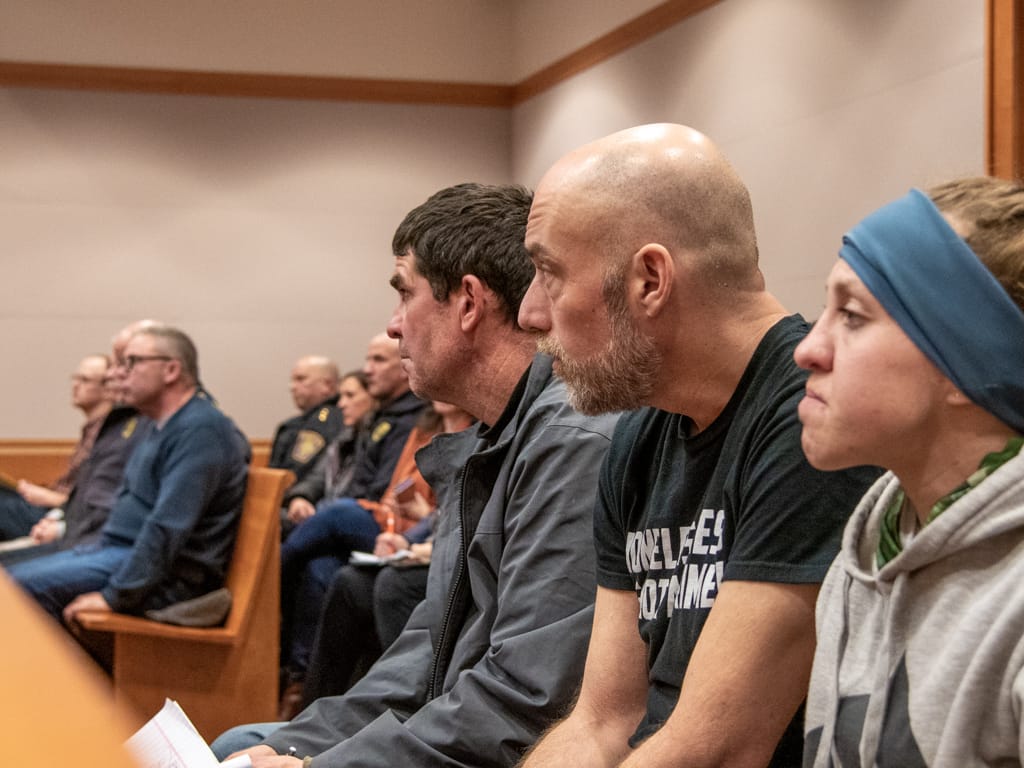Judge rules city has right to clear sidewalk encampment, says alternative shelter at senior center is ‘adequate’
Judge Kissinger wrote that while the Court is sympathetic to the plight of the people living at the camp, the situation is distinguishable from Martin. “Considering the grave risks to public health and safety posed by the ongoing presence of the encampment on public sidewalks in downtown Manchester

MANCHESTER, NH – The city will begin removing people on Wednesday from the homeless encampment outside the 199 Manchester St. shelter after a Superior Court judge greenlighted their removal.
Judge John C. Kissinger Jr., presiding in Hillsborough County Superior Court Northern District, said in his decision, issued Tuesday, that while the alternative shelter options offered by the city could be improved, presently they are “adequate.”
“It appears that the city is working very hard to provide those things, but the Court finds, at least at this preliminary stage of the case, that the city is not obligated to meet all of those standards immediately in order to satisfy both the ordinance requirement of overnight shelter and the Eighth Amendment. Critical to the Court’s analysis of these issues is that the alternative, allowing the encampment to remain on city sidewalks indefinitely, endangers the health and safety of the people living in the encampment, police, fire and emergency personnel, and others in the neighborhood.”
“City employees and non-profit partners have been working around the clock to ensure the health and safety of both the individuals experiencing homelessness in Manchester and the community at large, and this morning, the Hillsborough County Superior Court acknowledged our progress and ruled in favor of our ability to continue this work,” said Mayor Joyce Craig. “In addition to securing the area of Pine and Manchester Streets, the City of Manchester is moving forward on establishing a Women’s Shelter in partnership with the YWCA New Hampshire, opening an additional 24/7 winter emergency shelter, expanding access to substance use disorder treatment, and creating more permanent supportive housing options.””
“While we are disappointed with the court’s decision, we continue to believe that any eviction is unconstitutional in the absence of the City providing a 24-hour place for unhoused people to sleep,” said Gilles BIssonnette, legal director of the ACLU of New Hampshire. “We ask that the City of Manchester postpone any eviction if and until such sleeping space is provided 24 hours per day.”
The Eighth Amendment states that excessive bail shall not be required, nor excessive fines imposed, nor cruel and unusual punishments inflicted.
Asked if there would be an appeal, Bissonnette said, “We’re still evaluating our options, but we’re unlikely to be able to seek any form of judicial relief before today’s 5 p.m. deadline.”
Bissonnette, in court filings, contended the city was just chasing the houseless from one encampment to the next without providing needed accommodations. Kissinger conceded it is possible people being removed will try to find other public property in the city to set up camps.
The city said it has 31 beds available at the Cashin Center although unhoused individuals are not permitted to be there from 6 a.m. to 7 p.m. However, the city has a warming center at the 1269 Café at 456 Union St. during the day and provides transportation to the center.
“The more that can be done to provide better shelter and long-term housing options for unhoused people will reduce the likelihood that people will find themselves living in such conditions,” Kissinger wrote. “Nevertheless, although the alternative shelter options offered by the city could be improved, in the present circumstances they are adequate.”

The ACLU-NH filed the lawsuit against the city on behalf of Dennis Higgins and Freeman Toth. About 50 people reside at the sidewalk encampment, according to the ACLU. On Jan. 8, 2023, the city issued a notice ordering people residing there to vacate the premises by 12 a.m.
The order came a day after area business owners spoke at a Board of Mayor and Alderman meeting concerning how the encampment has affected their establishments.
The city, in arguing it could remove the encampment, cited an ordinance that deems it illegal for people to use public space for camping without prior written permission. The ordinance also says police will enforce the law only when an individual is on public property and there is an available overnight shelter.
Bissonnette argued that the city cannot enforce the ordinance because there are not enough overnight shelter beds available for those residing in the encampment. Citing Martin v. City of Boise, he argued that the local ordinance violates the Eighth Amendment if it “imposes criminal sanctions against homeless individuals for sleeping outdoors, on public property, when no alternative shelter is available to them.”
Kissinger wrote that while the Court is sympathetic to the plight of the people living at the camp, the situation is distinguishable from Martin. “Considering the grave risks to public health and safety posed by the ongoing presence of the encampment on public sidewalks in downtown Manchester and the availability of safe alternatives for the people living in the encampment, a temporary restraining order is not justified.”
The city contended the camp poses a serious public health hazard, citing one death and overdoses that have occurred there and an incident where a man set a tent on fire. It said over the past few months, police were called to the site about 380 times for alleged assaults and drug use. There are no accessible public bathrooms in close proximity and there are issues with needles associated with illegal drug use and trash associated with the encampment.
Kissinger wrote that not surprisingly “this activity has had a significant impact on neighbors, including residents and local businesses and a child care center which had been located nearby has purportedly closed.”
The city’s Emergency Operations Center (EOC) was opened on Friday, Jan. 6, to serve as a consolidation point for first responders and departments to address unsheltered homelessness. Since opening, the city has:
- Partnered with the YWCA New Hampshire to open a new Women’s Shelter at the site of the vacant former Tirrell House.
- Established a temporary warming station with cots at the William B. Cashin Activity Center that has served 43 unique individuals experiencing homelessness.
- Launched the Manchester Winter Relief Fund, a fund through the Granite United Way to ensure services and shelter to unhoused individuals.
- Allocated $871,990 from the city’s remaining ARP, CDBG, and Affordable Housing Trust Fund dedicated to addressing unsheltered homelessness this winter.
Additionally, more than $11 million in federal funds were allocated for supportive and affordable housing over the last two years, daily outreach to encampments by first responders and outreach workers, administering the state’s only Healthcare for the Homeless program, and more.
Following Tuesday’s decision, Alderman At-Large Joseph Levasseur issued the following statement:
“I am thankful for the court’s thoughtful decision. The vagrants that dug in on Manchester and Pine street sidewalks have literally held the property owners and businesses hostage these past few months. Thankfully this will now stop. There is shelter for anyone living in that encampment and we urge them to use it; or to go to another city, town or state that does provide camping on sidewalks,” Levasseur wrote.

Dam Wright, an advocate for the unhoused who has spoken as several aldermanic meetings in the past few months says a shelter, no matter the model, is not the answer.
“In the long term, the best way to combat the problem of houselessness, and its significantly-negative impact on the city at large, is to get these people housed. Being unhoused, whether you live in a shelter or a tent or elsewhere, is the biggest of all barriers to effectively dealing with the problems that contribute to your perpetual homelessness – problems which include mental or physical health problems, substance use disorders, and so forth,” Wright says. “All of these problems become far easier to deal with once you put someone into permanent and sustainable housing. This is the core concept of the ‘housing first’ model, which has proven not only to be the most effective way of dealing with these immensely impactful social problems of overall public health and safety, but has also proven to be the cheapest option, when compared with alternatives like ‘encampment evictions’ (aka ‘sweeps’). This is clearly evidenced by the extensive data which has been compiled at the National Coalition for the Homeless.”
Wright and other advocates say the city’s decision to vacate the encampment without providing a meaningful alternative is simply repeating what’s happened time and time again with sweeps of other encampments around the city.
“We have tried to ‘sweep’ our way out of this problem. We have tried to fix it with everything from citations to arrests, to what the ACLU is now calling an outright violation of their Eighth Amendment rights against ‘cruel and unusual punishment.” All as things get predictably worse for the housed and the unhoused, with every encampment sweep,” Wright says. “From Amoskeag, to the Courthouse, to Firestone, to the Bucket, to Econolodge, to Cracker Barrel, to the downtown parks. Thinking this won’t get worse if we sweep the new encampment by the shelter is bordering on sheer madness,” Wright said. “When will this insanity end? And when will we start to face this problem in ways that are actually informed, and realistic, so that we can finally have an informed and realistic hope of actually ending these problems, once and for all?”
A regular meeting of the city’s Board of Mayor and Aldermen is scheduled for Tuesday at 7 p.m., beginning with public comment. Prior to the full board meeting a 5 p.m. special committee on Alcohol, Drugs and Youth will hear a proposal from Amanda Robichaud of GateHouse Treatment, which includes a $300,000 plan to bring more outreach and detox capacity to the city.




